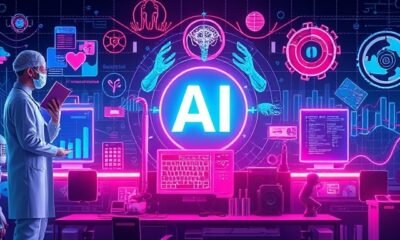Artificial Intelligence
Challenges and Ethical Considerations Of Using Al In Predictive Policing
AI’s role in predictive policing offers significant advancements in crime prevention, but it also raises critical ethical concerns. From issues of bias to privacy violations, understanding the challenges and ethical considerations of using AI in law enforcement is essential to ensure these technologies are used responsibly and fairly.

Artificial Intelligence is emerging as one of the most active and fast-evolving fields in technology and digital processes. In homes through smart homes, to healthcare to through novel technologies, AI is revolutionizing the world today. However, the challenges and ethical considerations of using AI in predictive policing present critical concerns that need careful examination.
Definition:
AI in policing means using computers to help police with jobs that normally need human thinking. This can include looking at data, guessing where artificial intelligence in crime detection might happen, and helping police make good decisions to keep people safe.
As AI continues to evolve, addressing challenges like ethical dilemmas and unintended consequences becomes vital. My aim is to find over how human beings can take the opportunity of using Artificial Intelligence in the right manner that benefits the society.
Are you excited to explore more about the future of AI in policing?
Ethical Challenges and Data Bias:
Artificial Intelligence technology can change the course of many businesses, but at the same time, it has ethical dilemmas mainly with data bias. AI systems designs are capable of being bias because when the AI system is trained using biased data it will give unfair or discriminator results in people or to groups of people.
Definition of Data Bias:
Informally, data bias means that AI training sets contain some form of prejudice or misrepresentation in terms of data. The information used to train the AI systems is often informed by the same bias that is rife in societies, and this results in AI discriminating between different people.
It has already been discovered that real-world applications like hiring algorithms and facial recognition have some prejudices. For example, some hiring systems may have pre-programmed filters that automatically select male candidates over female candidates; facial recognition also gives poor or discriminated results for people of color.
Strategies to Mitigate Data Bias:
One of the ways that have been put forward as a way of minimizing bias in AI is by using samples that incorporate as many people and situations as possible. To that point, there are actions that can be taken to make AI trainers themselves fair as well as to always check the fairness of AI systems. It is also important for the AI developers to come clean and ensure that the development involves diverse people.
I would like to know how we can control bias in AI. What measures should be taken by the developers to have more fairness in models?

AI’s Lack of Empathy and Context:
AI is still in its infancy and with the progress that is being made in this field we know that it is still weak when it comes to things such as emotional intelligence and cultural sensitivity. Although AI can handle so many data as well as make decisions, it cannot feel the emotions of society or cannot recognize the culture behind many tasks in society.
Explanation of AI’s Lack of Emotional Intelligence and Cultural Context:
Despite the advances that have been made in this field AI systems are still unable to interpret feelings or respond to an emotional stimulus. These models work on the patterns that are provided to them as datasets and cannot understand emotions of people or cultural sensitivity hence they are not a good bet for implementing in situations where one needs to assess emotions or cultural context.
This tends to become problematic where there is need to empathize with the patient such as in mental health facility. For instance, the mental health chatbots will give advice based on developed algorithms, but they will not give the client the kind of comfort and support a therapist can provide. This can make users feel as though they arelogen left behind or not understood when they are in need the most.
Challenges AI Faces in Handling Sensitive Tasks Requiring Empathy:
AI is not capable of providing services that demands feelings such as counselling or crisis intervention. It is good for someone to be given direction or information, but it is not good to be guided by AI during moments of emotional upheave. This means that AI might not pick cues that would help it know when its advice is comforting and when it is cold and unfeeling.
Potential Solutions:
In response to these issues, possibly, the proper incorporation of artificial intelligence with human supervision in situations that include emotional intelligence is plausible. AI performs information gathering or boring jobs and on the other hand humans who have the ability to address sensitive matters with adequate empathy. This approach guarantees that people get the right information in addition to psychological support.
How do you believe that AI can move forward in learning human emotions?
Balancing AI with Human Expertise:
With the advancement of AI in almost every field, there is need to blend the AI with professional knowledge. Despite the immense opportune to render incredible capabilities, human intelligence input is critical in making sure that the decisions made by the systems are moral, knowledgeable and practical.
Importance of Human Expertise in Complementing AI Decisions:
AI is able to policing analyze large quantities of information within a shorter time and is capable of analyzing data that would otherwise can be rather challenging to humans. But, the program cannot deliver a critical thinking capability, moral function, or judgement based on experience. There is need of human involvement to guide AI systems, to ensure outputs are correct and to make decisions that are acceptable to the society.
The dangers of depending on AI are making themselves felt, especially when it comes to such vital industries as healthcare and justice. For instance, in healthcare, an AI system may predict an ideal treatment plan given certain data but only a medical practitioner can think about the patient in as much as his/her history, background, and even choice can permit. While justice systems AI can provide valuable predictive policing ethics, however, a human judge must provide fairness and handle the specifics of each case.
Risks of Over-Reliance on AI in Critical Areas:
Outsourcing some of the important aspects of life to AI software can result in disastrous errors. For example, AI in heath care can make wrong decisions on a patient’s condition, with wrong diagnosis or treatment. In the scenario of justice system, self-preference AI models can make decisions regarding sentencing or paroles that discriminating. These risks explain why integration of AI in various processes should ensure that there would be human supervision.
Examples of Successful Human-AI Collaborations and Best Practices to Maintain Balance:
For every human-AI collaboration, there are many examples of successful human-AI collaborations. In such fields as finance, for instance, AI becomes useful in flagging potential fraudulent transactions, although it is the specialists who need to verify the information. AI in medicine involves using AI to interpret medical images but doctors are the ones who finally make decisions having in mind their experience.
In your opinion, what are the ways that AI and human knowledge can better be integrated?
Ethical Use and Data Privacy Concerns:
With the advancements in Artificial Intelligence (AI) the usage and the specific ethical dilemmas of Artificial Intelligence are emerging. On the one hand, AI is rich in opportunities, however, introducing it to such spheres as surveillance or data gathering, one has to think about ethics.
Discussion on Ethical AI Deployment:
Ethical deployment of AI entails making confirmation that the technologies employed in artificial intelligence are useful in propping up liberty, but not infringing on freedom and privacy of individuals. Sometimes AI is used in security systems, or to control people’s actions, for example, through advertising or voting. The degree of superintendence that AI could perform on the exercises of individuals presents an acceptable level of ethical dilemmas if not controlled.
The other issue of large data acquisition by AI systems is privacy, especially with reference to personal information. AI gathers data from many sources; it may be web browsing history, social media, or even the way a person or an object moves, as detected by devices. This information is usually employed to serve the user or for decision making purposes; however, it can also be utilized en mass without the user’s consent.
Data Privacy Concerns:
A major concern of AI is the manner in which personal data is dealt with. Machine learning based AI systems generally use big data which consists of personal information. Unfortunately, this data can be manipulated, or used in a way that is either invasive of privacy, or patronizing, where there are no clear policies in place. For example, AI systems might gather and employ account data for purposes other than the stated ones, and therefore threaten the user with identity fraud.
Best Practices for Ethical AI Usage:
To know how to prevent misuse of AI, the following measures should be adopted since they are the standards of AI usage; The developers of AI should be well-aware of the methods in which data is gathered, stored, and utilized; the data must be controlled entirely by the user. Consent processes must also be transparent so that users know not only what sort of data is being collected, but how it will be used. Besides, ethical behaviours can be achieved through frequency of audits as well as adhering to the set data protection regulations.
In your opinion, Is it possible to achieve transparency in AI systems?
Privacy, Policy, and Ethical Issues:
The AI is gradually being integrated into society and as a result the topics on privacy, policy and ethics are being brought out first. The current advancement of AI is such that it has its unique problems regarding regulation and control of its application as well as legal responsibility for the results achieved and personal privacy.
Overview of Global Policy Challenges in Regulating AI:
AI regulation is still in progress all over the world. Currently the regulation of artificial intelligence is an emergent field where every country is formulating its rules and regulation therefore there is no standardization. Most states are failing to develop effective mechanisms that are responsive to the rapidly growing opportunities and threats which AI presents to privacy, security, and human rights. As a result, the development of effective, the scalable, and the ethical policies will be crucial as long as AI progresses.
Lack of liability is also an issue once artificial intelligence systems are not effective. One of the challenges that arise when it comes to AI is that the AI is created and implemented by so many people. For instance, if an autonomous car is involved in an accident, whom is legally liable, the car manufacturer, the software creator or the ai? Such types of questions pose the problem of responsibility for AI in terms of legal regulation.
Discussion on Accountability:
The consequences of the failure of AI can be significant but who then should bear the blame? Since AI makes decision independently based on the data it receives, the answer is not always straightforward. In most instances, the task relies on the organizations that design, implement, and manage the artificial intelligence tools. It does not take long, however, for accountability questions to become more challenging to answer, as AI becomes more intricate and self-governing. To this effect, there is the need to create clear guidelines and assign legal responsibility for users and developers alike.
Role of Governments, Tech Companies, and Society in Addressing Privacy and Ethical Dilemmas:
This paper has highlighted the role of governments, technology firms as well as society in addressing all quandaries of privacy and ethics regarding artificial intelligence. Regulations and standards are the responsibility of governments, to regulate the practices used in Artificial Intelligence. AI integration into technologies requires business organizations to exercise considerable caution in their approach by ensuring that the AI systems used meet several important requirements that include; being transparent, secure, and ethical. It is up to society to demand governments and technology companies to take responsibility for issues, arising from the application of AI solutions, and personal privacy.
Finally, what are you of the opinion that is the biggest ethical concern in AI as we speak?
Conclusion:
Lastly, we have discussed the essential problems and unethical aspects by which they are surrounded, such as data bias, empathy, privacy, and responsibility. However, to advance with caution, there has to be cooperation between developers, policies, and society at large. The developers, therefore, should ensure that developing of AI systems will be fair while the policymakers should ensure that they set appropriate policies. It is therefore important that members of society continue to practice discussions that are aimed at the achievement of proper use of artificial intelligence. The advancement of Artificial Intelligence is going to be bright in future but it is necessary to resolve these issues.
What do you think will happen to AI in the future? How can we ensure that is done in an ethical manner? Share your ideas below!
-

 Artificial Intelligence8 months ago
Artificial Intelligence8 months agoWhat is Artificial Intelligence? A Comprehensive Guide for Businesses and Enthusiasts
-

 Artificial Intelligence6 months ago
Artificial Intelligence6 months agoHow to Use Grok AI: A Complete Guide
-

 Artificial Intelligence8 months ago
Artificial Intelligence8 months agoUnlocking the Power of Artificial Intelligence Tools
-

 Artificial Intelligence7 months ago
Artificial Intelligence7 months agoWhat is DeepSeek? Revolutionizing AI with Cutting-Edge Solutions
-

 Artificial Intelligence3 months ago
Artificial Intelligence3 months agoAI Technologies in Warehouse Automation:
-

 Artificial Intelligence4 months ago
Artificial Intelligence4 months agoMeta’s AI Push: The Standalone Assistant App Set to Rival ChatGPT
-

 Artificial Intelligence3 months ago
Artificial Intelligence3 months agoHow Artificial Intelligence is Revolutionizing Logistics:
-

 Artificial Intelligence3 months ago
Artificial Intelligence3 months agoPredictive Analytics for Demand Forecasting:


